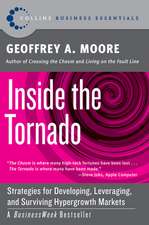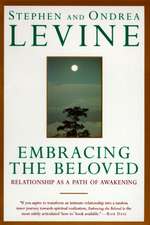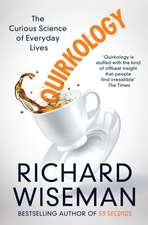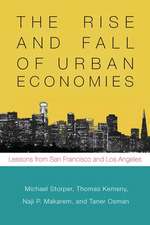The Luck Factor: Book Club Andreea Roșca
Autor Richard Wisemanen Limba Engleză Paperback – 2004
A revolutionary study of luck and its power to transform our lives.
Have you ever wondered why some people seem to have all the luck, and others seem to be born unlucky? Any why do some people get to lead fulfilling lives, while others face endless failure and sadness? Is it just a matter of fate, or can unlucky people improve their luck and their lives?
Ten years ago, Dr. Richard Wiseman decided to search for the elusive luck factor by charting the actual beliefs and experiences of lucky and unlucky people. From the results, he identified four main factors that explained luck. He was then able to show a group of people, who considered themselves unlucky, how to think and behave like lucky people. The results were astounding, with almost all participants reporting significant life changes -- including increased levels of self-esteem, physical well-being, confidence and success.
The principles Dr. Wiseman reveals in this ground-breaking study can teach you how to change your luck, and literally change your life.
Preț: 57.31 lei
Preț vechi: 69.10 lei
-17% Nou
10.97€ • 11.41$ • 9.05£
Carte disponibilă
Livrare economică 27 martie-02 aprilie
Livrare express 08-14 martie pentru 29.03 lei
Specificații
ISBN-10: 0099443244
Pagini: 240
Ilustrații: Illustrations
Dimensiuni: 129 x 198 x 19 mm
Greutate: 0.18 kg
Editura: CORNERSTONE
Seria Book Club Andreea Roșca
Locul publicării:United Kingdom
Notă biografică
Extras
CHAPTER THREE
Principle One: Maximise Your Chance Opportunities
Principle:Lucky people create, notice and act upon the chance opportunities in their life
Lucky people’s lives are full of chance opportunities. In the last chapter I described the life of professional poet Jodie, whose lucky chance encounters have helped her achieve many of her lifelong dreams and ambitions. We also met Lee, a marketing manager who has an uncanny knack of being in the right place at the right time. He met his future wife by chance and puts much of his success in business down to lucky encounters. Then there was serial competition winner Lynne. The entire course of Lynne’s life was altered when, quite by chance, she came across a newspaper article about a woman who had won several prizes in competitions. Lynne, Lee and Jodie were typical of the lucky people involved in my research. Without trying, opportunities just seem to come their way.
Lucky people are often convinced that these opportunities are the result of pure chance. They just happen to open newspapers at the right page, come across the right page on the Internet, walk down the street at the right time or go to a party and meet the right person – but my work revealed that these seemingly chance opportunities are the result of lucky people’s psychological make-up. The way they think and behave makes them far more likely than others to create, notice and upon chance opportunities in their lives. I uncovered hitherto unexplored techniques that lucky people use to maximise the role of seemingly chance opportunities in their lives. I discovered that being in the right place at the right time is actually all about being in the right state of mind.
Wendy is a 40-year-old housewife. She considers herself lucky in many aspects of her life, but is especially fortunate when it comes to winning competitions. On average, she wins about three prizes a week. Some of these prizes are quite small, but many have been substantial. In the last five years she has won large cash prizes and several major holidays abroad. Wendy certainly seems to have a magical ability to win competitions – and she is not the only one. In the previous chapter I described how Lynne has won several large prizes in competitions, including several cars and holidays. The same is also true of Joe. Like both Wendy and Lynne, Joe considers himself to be very lucky in many areas of his life. He has been happily married for forty years and has a loving family. However, Joe is especially lucky in competitions, and his recent successes include winning televisions, a day spent on the set of a well-known television soap opera, and several holidays.
What is behind Lynne, Wendy and Joe’s winning ways? Their secret is surprisingly simple. They all enter a very large number of competitions. Each week, Wendy enters about sixty postal competitions, and about seventy Internet-based competitions. Likewise, both Lynne and Joe enter about fifty competitions a week, and their chances of winning are increased with each and every entry. All three of them were well aware that their lucky winning ways are, in reality, due to the large number of competitions they enter. As Wendy explained, ‘I am a lucky person, but luck is what you make it. I win a lot of competitions and prizes, but I do put a huge amount of effort into it.’ Joe commented:
People always said to me they think I’m very lucky because of the amount of competitions that I win. But then they tell me that they don’t enter many themselves, and I think, ‘Well, if you don’t enter, you have no chance of winning.’ They look at me as being very lucky, but I think you make your own luck … as I say to them ‘You’ve got to be in to win.’
I wondered whether the same idea might also account for the other types of opportunities that lucky people constantly encounter in their lives; whether this could explain why they often meet interesting people at parties and come across newspaper articles that change their lives? I managed to go backstage and discover the reality behind the illusion. And my research revealed that it could all be summed up in just one word – personality.
People who tend to think and behave in the same way are said to have the same personality. The concept of personality is central to modern day psychology, and a huge amount of time and effort has been invested in working out the best way of accurately classifying people’s personality. Although it has often been far from easy, the results have been very impressive.
SOMEWHERE ALONG THE LINE I MADE THE SWITCH AND WAS ABLE TO LOOK AT THE BRIGHT SIDE RATHER THAN THE DARK SIDE ALL THE TIME. NOW I LOOK AT EVERYTHING AND THINK HOW LUCKY I AM.
MICHELLE PFEIFFER
After years of research, most psychologists agree that there are only five underlying dimensions to our personalities: five dimensions on which we all vary. These dimensions have been found in both the young and old, in men and women and across many different cultures. These dimensions are often referred to as Agreeableness, Conscientiousness, Extroversion, Neuroticism and Openness.
I compared the personalities of lucky and unlucky people on the five dimensions of personality. The first dimension I examined is referred to as ‘Agreeableness’. This is a measure of the degree to which someone is sympathetic towards others and willing to help them. I wondered whether lucky people were the recipients of large amounts of good fortune because they tended to help others, and so others tended to help them in return. Interestingly, lucky people scored no higher on Agreeableness than unlucky people.
The second dimension that I examined was that of Conscientiousness. This is a measure of the degree to which a person is self-disciplined, strong willed and determined. Perhaps lucky people experienced more good fortune because they simply worked harder than unlucky people. But once again, there was very little difference in the Conscientiousness scores of lucky and unlucky people.
The groups did, however, obtain very different scores on the remaining three personality dimensions – Extroversion, Neuroticism and Openness. The differences explained why lucky people constantly encounter chance opportunities in their lives while unlucky people do not. Each of these personality traits relates to a different sub-principle that follows.
Sub-principle 1:Lucky people build and maintain a strong ‘network of luck’
My research revealed that lucky people scored much higher than unlucky people on a dimension of personality known as Extroversion. Extroverts are far more sociable than introverts. They enjoy spending time visiting friends and going to parties, and tend to be attracted to jobs that involve working with other people. Introverts are far more inward looking. They are happy to spend time on their own, and feel most contented when engaged in more solitary activities, such as reading a good book.
Additional research revealed that there are three ways in which lucky people’s extroversion significantly increases the likelihood of them having a lucky chance encounter – meeting a large number of people, being a ‘social magnet’, and keeping in contact with people.
First, in the same way that Lynne, Joe and Wendy increase their chances of winning prizes by entering lots of competitions, so lucky people dramatically increase the possibility of a lucky chance encounter by meeting a large number of people in their daily lives. The concept is simple. The more people they meet, the greater opportunity they have of running into someone who has a positive effect on their lives.
Take the case of Robert, a 45-year-old aircraft safety officer from England. Robert is very lucky and his life is peppered with chance encounters. A few years ago, Robert and his wife flew to France to celebrate New Year. They had intended to fly back a few days later, but heavy snowfall grounded all available flights. As the snow wasn’t going to clear for days, Robert and his wife decided to return to England by ferry, and made their way to the French port of Boulogne. However, there was a problem, as the ferry’s destination was a port that was a considerable distance from their house, and the heavy snowfall had disrupted public transport so that it was going to be impossible for them to make their way home when they got to England. Just as Robert and his wife were discussing the problem, the door of the waiting room opened, and in walked another British couple who were also going to catch the ferry. Robert started to chat to them, and was amazed to discover that they lived very close to his home. They offered to give Robert and his wife a lift and, within minutes, Robert’s problems were over.
Another time, Robert and his wife wanted to move house. They had looked at several properties, but not seen anything they liked. One day, Robert just happened to be walking along the high street and saw an estate agent he knew coming out of his office. Robert could have kept walking, but instead decided to ask the estate agent whether he had any suitable properties available. The agent said that he was sorry but he didn’t, and started to walk away. A few seconds later he turned around, and suggested that Robert look at a house that had only just come on the market. Robert immediately drove around to the house, fell in love with it and bought it that day. Robert and his wife have been living there for over twenty years and describe it as their dream home.
When I interviewed him, Robert described himself as very outgoing and talkative. He told me that if he is standing in a supermarket queue, he will often start chatting to the people next to him, and described how he frequently strikes up conversations with strangers. Robert really enjoys meeting people and spending time with them – and the more people he meets, the greater his chances of coming into contact with someone who can have a beneficial effect on his life.
Joseph, a 35-year-old mature student, has also encountered life-changing chance opportunities in his life. When he was young he found it very difficult to settle down in school, and was in constant trouble with the police. By his late twenties he had drifted in and out of prison for several minor offences, and from one job to another. Then a chance encounter changed his life. He was travelling on a train when it got stuck between two stations. Joseph became bored and struck up a conversation with the woman sitting next to him. She was a psychologist and the two of them started to talk about Joseph’s life, and he began to confess to some of his self-destructive tendencies. The woman was impressed with his insight and social skills, and suggested that he would make an excellent psychologist. As the train pulled into the station the two of them parted company, but the woman’s idea stuck in Joseph’s mind. He looked into the type of training and qualifications he would need to become a psychologist. He eventually made the decision to change his entire lifestyle and go to college. He is currently studying psychology at university and will graduate next year. Joseph told me: ‘I’ve learned that if you initiate conversation with people you can get a lot out of it – to me, it improves my luck immensely.’
Many other lucky people also reported how they consistently experienced good luck by simply connecting with the people they met on a daily basis. Take the case of Samantha. A few years ago she was working as a young secretary in a legal firm, secretly hoping to expand her horizons and get a job in the film world. The only problem was that she had no contacts and no rich relations to help her. On a rainy afternoon she walked out of a doctor’s appointment and hailed a cab on Central Park West in New York to get back to her office. Just as the cab arrived, an older man walked up to her and asked if he could share the car with her. Samantha was naturally outgoing and, as they rode through the park, she struck up a conversation with him and discovered that he was an executive at a movie company. She told him of her secret longings to be part of the film world and how she would be glad to accept the lowliest of jobs just to get a foot in the door. He arranged for her to meet with the personnel director at his company and she was immediately offered a starting position as a secretary to a lawyer, but soon made the transition to film acquisitions. Five years later Samantha is a busy, successful, film executive in Los Angeles who recognizes that she seized an opportunity while being in the right place at the right time.
Another way in which lucky people increase the likelihood of chance encounters in their lives revolves around a concept known as ‘social magnetism’. Psychologists have noticed that certain people seem able to draw other people towards them.26 These ‘social magnets’ often find that whenever they go to parties or attend meetings, strangers initiate conversations with them. When they walk along the street, people frequently ask them for directions or the correct time. For some strange reason, other people just seem drawn to them. Perhaps not surprisingly, far more extroverts than introverts are ‘social magnets’.
Research has revealed that these people attract others because, without realising it, ‘social magnets’ exhibit the types of body language and facial expressions that other people find attractive and inviting. Interestingly, lucky people exhibit exactly the same pattern of behaviour. I asked some fellow psychologists to watch the videotapes of interviews that I had conducted with lucky and unlucky people. I removed the soundtrack from the interviews so that the viewers had no way of knowing which of the interviewees were lucky and which were unlucky. I asked everyone to rate how my interviewees looked and behaved during the interviews. They counted the number of times they smiled, measured the amount of eye contact they made and noted whether they used certain gestures.
The differences between the lucky and unlucky people were dramatic. The lucky people smiled twice as much as unlucky people and engaged in far more eye contact. However, perhaps the biggest differences emerged when we examined the degree to which they engaged in ‘open’ or ‘closed’ body language. People exhibit ‘closed’ body language when they cross their arms and legs, and orient themselves away from the person they are speaking to. ‘Open’ body language is exactly the opposite. People point their bodies towards the person that they are speaking to, uncross their arms and legs and often make gestures that involve them displaying open palms. Lucky people tended to engage in three times as much ‘open’ body language as unlucky people.
Lucky people’s body language and facial expressions attract other people to them, and, again, the more people they meet, the greater the probability of them having a chance encounter. The more people they talk to at a party, the greater their chances of meeting their dream partner. The more people they talk to about business, the greater the chances of meeting a new client or someone who has a beneficial impact on their career.
Still this wasn’t the full picture. In addition to initiating conversations with lots of people, and being social magnets, lucky extroverts also engage in a third type of behaviour that increases the probability of living a life full of chance opportunities. This third type of behaviour perhaps plays the biggest role in their success.
Lucky people are effective at building secure, and long lasting, attachments with the people that they meet. They are easy to get to know and most people like them. They tend to be trusting and form close friendships with others. As a result, they often keep in touch with a much larger number of friends and colleagues than unlucky people, and time and time again, this network of friends helps promote opportunity in their lives.
Take the case of Kathy, a 50-year-old administrator. Kathy considers herself to be extremely lucky in all areas of her life. She has been happily married for twenty-three years and has two healthy children. She described herself as always being in the right place at the right time. A few years ago she was considering returning to work after having taken a career break to bring up her children. She wasn’t sure if her skills were still marketable, so called an old friend in the business world and arranged to meet him. She sought his advice for re-entry and, as they started to chat about his new promotion, he mentioned that he was going to advertise for a personal assistant very soon. She said that she would be willing to start again at that level, and he suggested that she apply. Kathy was offered the job and accepted. Six years later she is still working with her friend and loves the job. She told me that she puts much of her luck down to her attitude towards people:
I’m a collector of people, I like people and don’t have any problems making friends. And I try to keep in touch with them all. You can’t keep in touch with everybody, but I try my best.
LUCK IS BELIEVING YOU'RE LUCKY.
TENNESSEE WILLIAMS
Kathy has built up an impressive network of friends and colleagues, dating back to school. To celebrate her birthday, she organised a dinner for her fifty closest friends. She had kept in touch with people from all parts of the world and from all stages of her life.
Kathy wasn’t the only lucky person to stress the importance of keeping in touch with friends and colleagues. In the previous chapter we met Jodie, a professional poet now living in New York. For the past two years she has been very lucky, and chance encounters have helped her to achieve many of her lifelong dreams and ambitions. Jodie increases the likelihood of such chance encounters in her life by engaging in conversation with the people that she meets and keeping in touch with them. She is also very well connected within her community of writers and poets, and knows hundreds of people on first name terms. I asked her about this aspect of her life:
When I interact with people, it’s completely sincere and authentic, and I really care about the relationships. I don’t feel like a writer holed up in my house. Our communities are homes. So when I realised who my communities are – who’s really sup-porting me, where I feel like I’m in a family – I got very busy nurturing those communities, and trying to figure out how to stay in touch with them.
These techniques are often especially effective because they help set up, and maintain, a huge ‘network of luck’. Sociologists have estimated that, on average, we all know approximately 300 people on first name terms. When we meet someone and start chatting to them, we are only one step, or handshake, away from the people that they know. Let’s suppose that you are at the party and start chatting to a woman named Sue. You have never met Sue before, but she seems friendly and you mention that you are thinking of changing jobs. It is unlikely that Sue would be in a position to hire you, but she might know someone who is. By chatting to Sue, you are only a handshake away from the 300 people that she knows on first name terms. But it doesn’t end there. Each of Sue’s friends also knows 300 people on first name terms. Sue might introduce you to someone who is likely to know someone else interested in hiring you. You are only two handshakes away from roughly 300300 people – 90,000 new possibilities for a chance opportunity, just by saying hello to Sue.
Let’s return to Kathy’s fiftieth birthday party and her fifty guests from the different parts of her life. Let’s assume that each of these fifty people knew, on average, 300 different people on first name terms, and that each of them also knew another 300 people. Sitting at her birthday table, Kathy was just one handshake away from 15,000 people and two handshakes away from 4.5 million people! Given all of these potential contacts, it is perhaps not surprising that chance opportunities play such an important and positive role in Kathy’s life.
Without realising it, lucky people behave in a way that maximizes the chance opportunities in their lives. They chat to lots of people and spend time with them, attract other people to them and keep in touch with people. This results in a massive ‘network of luck’ and a huge potential for chance opportunities. It only takes one chance encounter to change a life.
Building a ‘network’ of luck
Jessica is a forensic scientist from Chicago, and has been lucky throughout her life:
I have my dream job, two wonderful children and a great guy that I love very much. It’s amazing, but when I look back at my life I realise that I have been lucky in just absolutely every area. Academic, friendships, meeting certain people, being in the right place at the right time, I can’t think of a single area where I’ve been unlucky.
Jessica has been especially lucky in her love life. She has always found it easy to meet partners and form lasting relationships with them. She is currently in a seven-year relationship with a guy who she considers to be ‘perfect’. In one interview, I asked her to describe how she had met her present partner.
I met him completely by chance at a dinner party. One night, a friend unexpectedly called me and asked if I would like to go to a dinner party with her. I hadn’t intended to go out that night, but thought that it sounded like fun. We went along, and that’s where I met the love of my life. He had also been dragged along by a friend of his.
I asked Jessica to explain what was behind her luck:
A large part of it stems from just being out there. If you’re busy and active, you meet lots of people and enter other spheres. I tend to chat to strangers and I think it’s that aspect of my personality that has brought me many of my friends and lovers. I’ll seek out interesting people rather than be bored. If I go to an event or a party, I’ll try and make certain that I’ll find somebody that’s interesting to talk to. Friends have told me that people are drawn to me because I am interested in them. I don’t just talk to people, I listen to them as well. It’s about sharing information, and I go to quite a lot of effort to connect with other people.
I also hold lots of parties. People generally say things like ‘Oh, that was a great party, you have such wonderful parties.’ I tend to invite lots of different people – parties with the same people get a little too predictable – and it’s a great way to introduce people to other people, and bring new people into the fold. I hold them every couple of months, and it really promotes my luck, in terms of careers and assistance, the little bits of tips we get in terms of financial planning and so on – it’s about sharing expertise and experiences.
It’s a probability game. If you meet twenty people in a week, chances are you’re gonna meet someone who’s interesting. So, part of it’s just improving your odds of experiencing nice events, nice encounters, by being out there. I think it’d be pretty hard to be lucky if you weren’t.



































